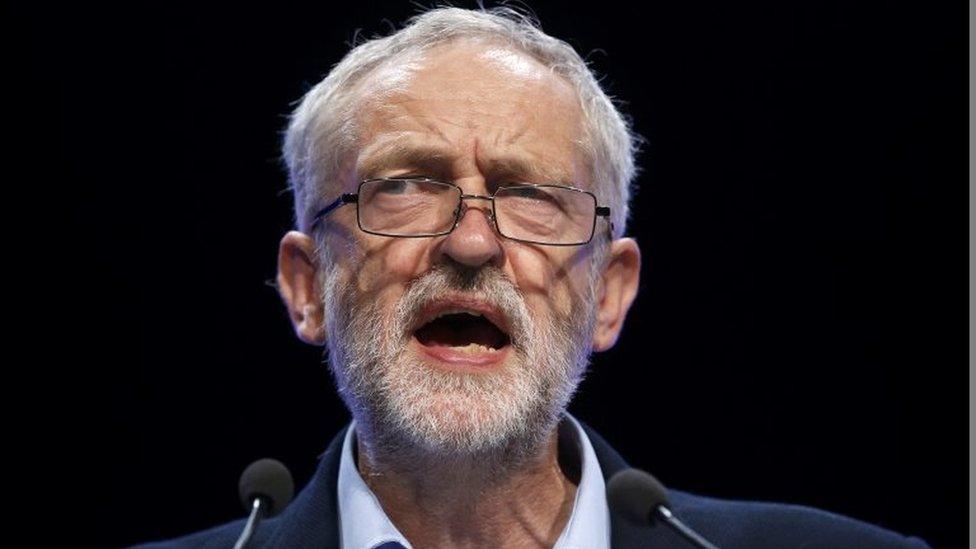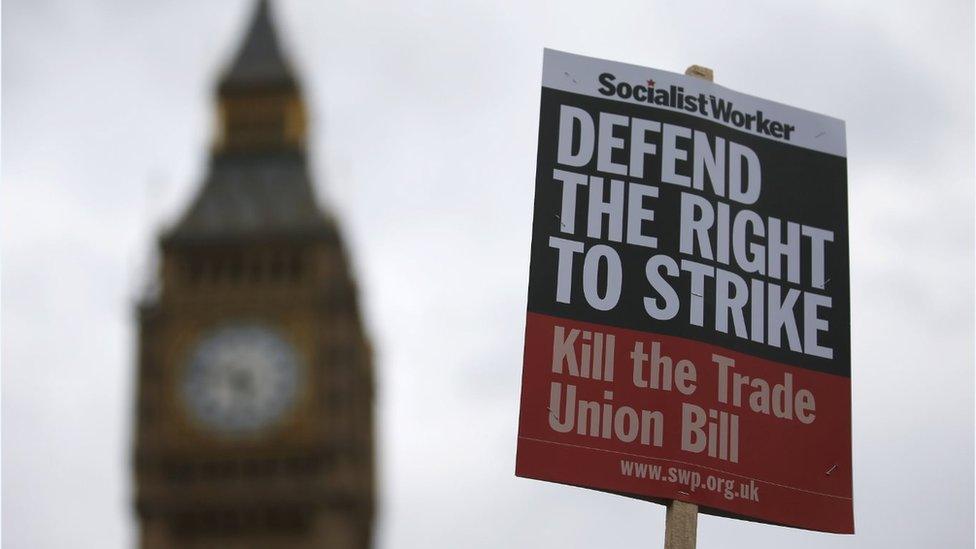Trade unions emboldened and empowered
- Published

Jeremy Corbyn has been addressing delegates at the TUC in Brighton
The consequences of Jeremy Corbyn's decisive victory in the Labour leadership contest will emerge steadily. As he meets people, as he makes speeches, as he faces the Prime Minister in the Commons, as he appears on telly and the wireless.
However, one consequence would appear to be immediately apparent which is that his success has emboldened and empowered the trades unions or, more precisely, their leadership.
Mr Corbyn himself is addressing the TUC this afternoon. But, in advance, notably bold sentiments have emerged from sundry union leaders.
Mark Serwotka of the Public and Commercial Service union, PCS, urges mass strikes in response to policies pursued by the UK government such as pay restraint, pension changes and the Bill constraining union rights.
Take sides
The Bill includes, among other things, a higher threshold for a strike ballot, an end to the "check-off" practice whereby union subs are deducted at source by employers and abolishing the practice of facilitating the conduct of union business in workplace time.
In Scotland, the PCS challenges the Scottish government in the person of John Swinney to "defy" that proposed law, particularly with regard to check off and workplace facility rules.
Neil Findlay MSP, a key Corbyn supporter in Scotland, notes that certain local authorities in Scotland are prepared to ignore the Bill. He argues it is "not unreasonable to expect the Scottish government to do the same."

Such debates are generally accompanied by an appeal to take sides. Such appeals are usually simplified for ease of digestion. The workers versus the bosses. The people versus the Tories. Scotland versus Westminster.
However, for democratically elected politicians, things are seldom so simple. Such is particularly the case for those who are already wielding power or who would seek, in their turn, to do so.
It is said that the UK government's trades union bill is unfair, unjust and unacceptable. It is, however, being implemented by a government with an electoral mandate. Labour would not have introduced this Bill. Labour did not win the election.
The argument will be made - with the poll tax customarily cited - that some items of legislation are so egregious that they require not just protest, but defiance. I understand that argument - and its historical genesis.
Again, though, that is a particular challenge for those who hold or would seek to hold sway over the public purse and public actions. By what right would they expect compliance with their laws if they are prepared to break a law introduced by a government of a different colour?
Expect loyalty
That is true for the Labour leadership at Westminster - who hope to gain power after the next election and are committed to repealing the union legislation.
But it is doubly true for the Scottish government who are in power right now, coterminous with Westminster Conservative rule. The SNP oppose the union legislation. They dislike it. They regard it as socially partisan.
Their stance features an added element, noting en passant that Scotland would not be subject to such legislation under independence.
But, right now, promising to oppose a law - or to repeal it, given the chance - is rather different from breaking that law.
Think of another example which, no doubt, is in the mind of the salon des refusés, those who declined to serve or were otherwise excluded from Mr Corbyn's frontbench.
Yes, they could agitate for a coup to replace Mr Corbyn. But consider the scope of his mandate within the Labour Party. If, improbably, they succeeded in bringing him down, by what right could they expect loyalty to the individual who replaced him?
PS: In a post earlier this week, I referred to a letter written by Bruce Crawford who convenes the Holyrood committee looking at the issue of more powers. I noted that Mr Crawford was complaining that the Scotland Bill, presently before Westminster, did not fully implement the recommendations of the Smith Commission.
Alex Johnstone, a Conservative member of the committee, dissented from Mr Crawford's action. He remains "extremely confident" that the Bill will deliver Smith and meet Scotland's needs. I should have noted that dissent. I do so now.